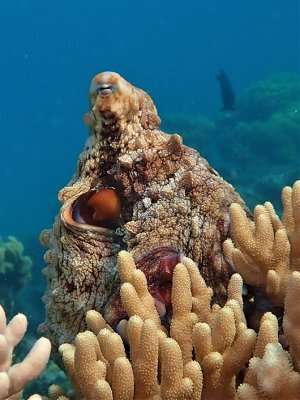How smart is an octopus?

The unique brainpower of octopuses—known for their intelligence and Houdini-like escapes—has been revealed by University of Queensland researchers.
Dr. Wen-Sung Chung from UQ's Queensland Brain Institute is part of a team that studied four octopus species using MRI techniques to produce detailed 3D images for comparing their unique brain structures.
He said octopus brains varied, depending on where a species lived, when it was active and if it interacted with other animals.
"The octopus is a master of camouflage, capable of solving complex tasks and their cognitive ability is said to approach that of some small mammals," Dr. Chung said.
"We investigated four species, including one deep-sea octopus, one solitary nocturnal species and two different reef dwellers active during daylight."
Dr. Chung said the octopus found in deep waters had a smooth brain like marsupials and rodents, suited for its slow pace of life and limited interactions with other animals.
The reef octopuses had a significantly larger brain with some properties similar to primates, adapted for complex visual tasks and social interaction in a busy, well-lit environment.
"These octopuses have some remarkably complex behaviors not known in other octopuses," Dr. Chung said.
Credit: University of Queensland
"For example, collaborative hunting with reef fish has been recorded, where the octopus usually leads and coral trout join by either actively seeking prey or opportunistically snatching small organisms flushed out by the octopus.
"The ability to receive and respond to gestures between different species as part of collaborative hunting demonstrates that octopus species have complex cognitive abilities."
The differences in brain structures between species relates to the size of the brain's surface area, with a larger surface area indicating a more complex nervous system and increased cognitive ability.
Professor Justin Marshall heads the team that was first to discover the differences in brain structure, opening the door to a better understanding of the complexity and evolution of these apparently "smart" animals.
He said the team's ongoing research aimed to provide insights into how octopus brain structure is linked to behavior, vision and advanced cognition.
The research has been published in Current Biology.The secret life of baby octopuses
More information: Wen-Sung Chung et al, Comparative brain structure and visual processing in octopus from different habitats, Current Biology (2021). DOI: 10.1016/j.cub.2021.10.070
Journal information: Current Biology
Provided by University of Queensland
Queensland researchers studying octopus brains find reef species are smarter and hunt in packs
ABC Far North / By Jemima Burt
Posted Sun 21 Nov 2021 a
Key points:
Queensland researchers studied the brains of four octopus species
Reef octopuses had significantly larger brains
Some teamed up with reef fish to hunt for food
The team from the University of Queensland's Brain Institute took four species of octopus, two of which live on the Great Barrier Reef, and studied their brain structure using ultra-detailed MRI imaging.
Results, published in scientific journal Current Biology, have shown for the first time that reef octopuses had a significantly larger brain than octopuses that lived in deep-sea waters – a discovery which will provide insights into how brain structure is linked with behaviour and cognition.
Post-doctoral researcher Wen-Sung Chung said one of the purposes of the study was to find out why the invertebrates had such a short life span – approximately one year.
"Why do they put so much power, so much energy in developing their brains?
"Keeping a brain with so many neurons is really costly," Dr Chung said.
Dr Chung said octopuses are estimated to have 500 million neurons.
"They are quite amazing; they have eight arms and no joints and they need to control their movement across the very complex seascape.
"They are also totally colour blind, they can only see blue or green, and how they manage to see reef and then make themselves well matched with the background is a big unknown," Dr Chung said.
Unusual inter-species friendships
Dr Chung said researchers also investigated the relationship which developed between octopuses and reef fish while hunting.
He said the observations were made during visits to Lizard Island, off the coast of Far North Queensland.
"The fish usually follow the octopus, the octopus will search for crabs, and then somehow the small food item will come out and the fish will eat it.
He said the animals were able to communicate with each other to hunt together.
"The ability to receive and respond to gestures between different species as part of collaborative hunting demonstrates that octopus species have complex cognitive abilities," Dr Chung said.
He said the finding was significant, considering the species' usual behaviour.
"Most of the time they live solitary, and very rarely interact with others.
"For those nocturnal especially, they live by themselves until the mating season and find a mate, otherwise they will just go out alone to catch crab or clams."
No comments:
Post a Comment